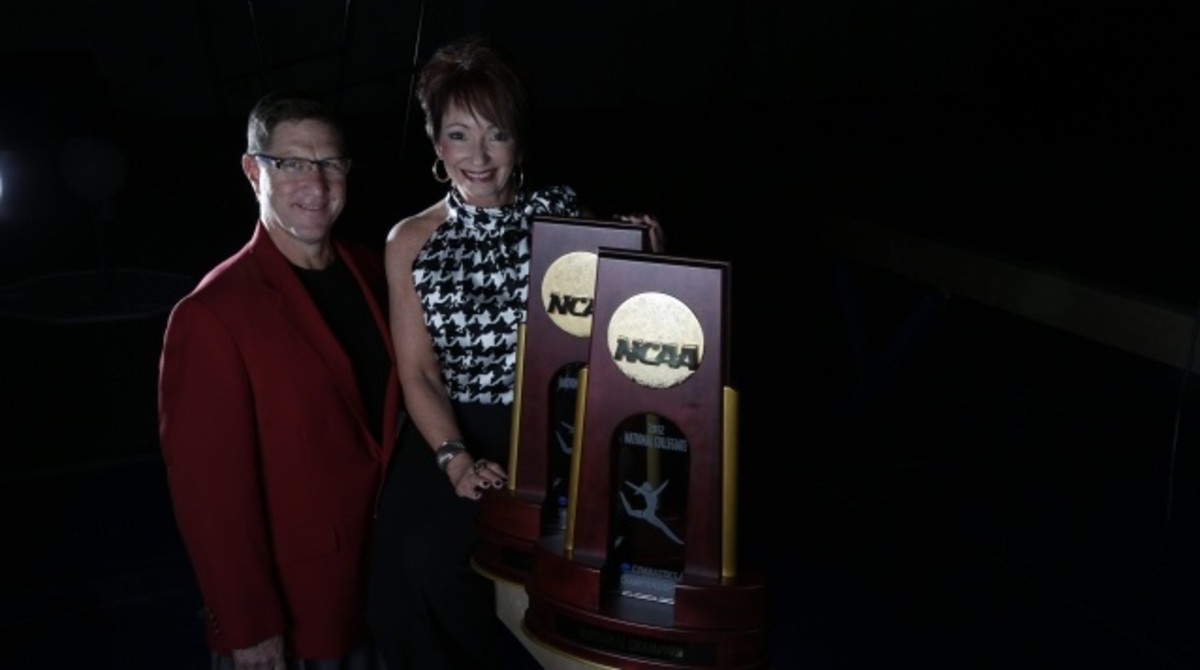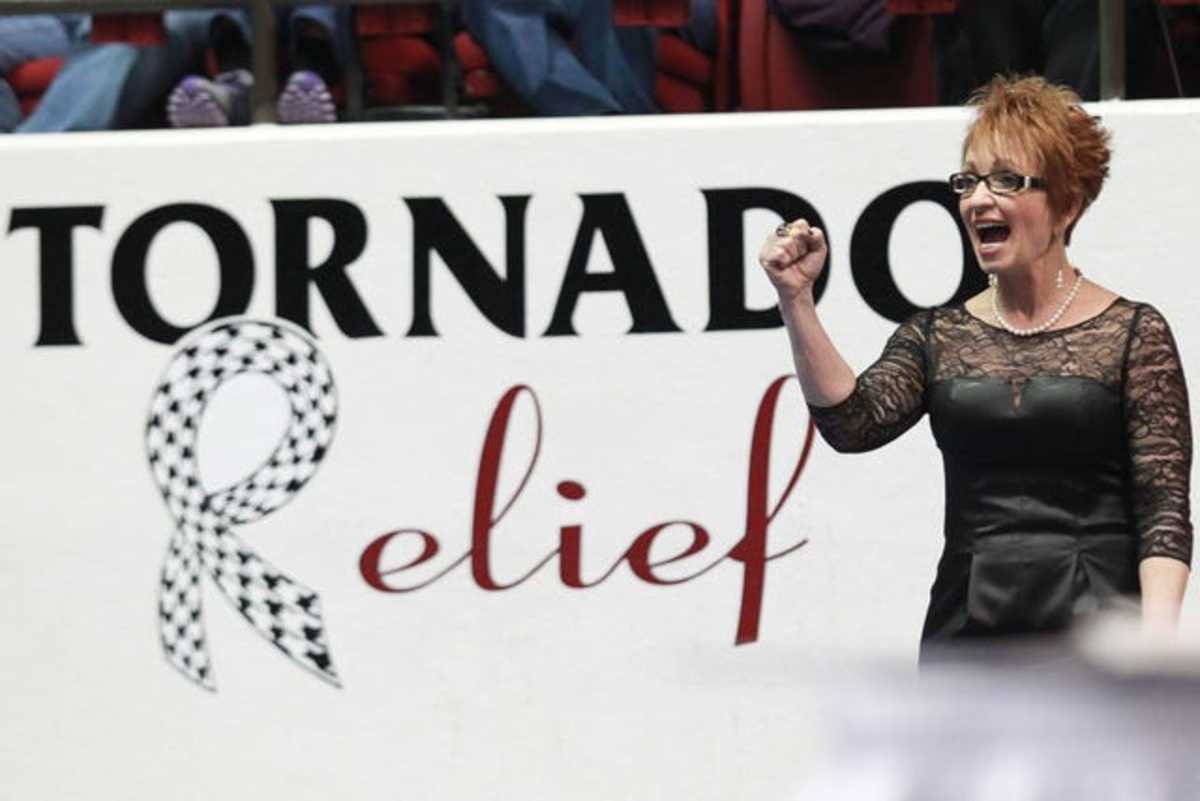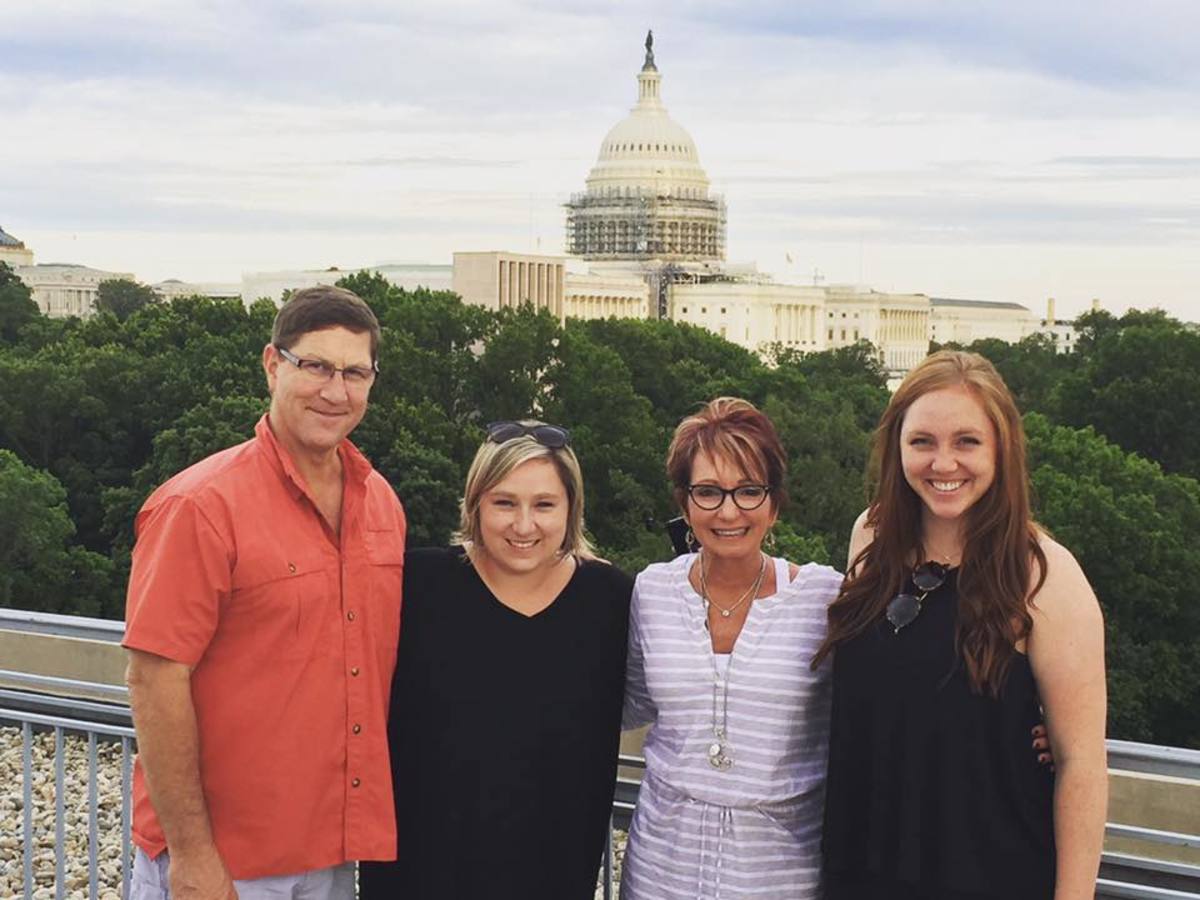78 Minutes: In Tuscaloosa's Hour of Need, the Patterson Family Answered the Call
“That was probably the longest hour and 18 minutes that we’ve ever experienced.”
Even 10 years later, one can still hear the concern and seriousness of tone in former University of Alabama gymnastics coach Sarah Patterson's voice.
On April 27, 2011, the Tuscaloosa landscape was reshaped forever in both a literal and figurative sense. On that day, an EF-4 tornado plowed through the community, killing 53 people — including six Alabama students — injuring 1,200, and cut a path from one end of town to the other.
Somewhere in the middle it went right up 15th Street, a crucial four-lane road that runs through the heart of the city, and caused an incredible amount of devastation. In mere moments, busy streets bustling with traffic, crowded housing filled with both university students and lifelong residents, restaurants and businesses that created the contagious college-town atmosphere the city is known for — vanished.
Where once there was bustling life, there was suddenly nothing but dust and rubble.
Countless families affected on April 27 were left to pick up the pieces and salvage what they could in both physical possessions and mental fortitude. To many, the situation seemed hopeless. Some, however, brought hope to those hopeless.
This is the story of one of those families.
Sarah and David Patterson
Ten days prior to April 27, Alabama gymnastics won its fifth national title in program history. The Crimson Tide edged UCLA in Cleveland and returned home as conquering heroes.
However, there was still work to be done.
Before taking some to enjoy the title victory, the athletes had unfinished business. Everyone wanted a piece of the queens of college gymnastics, only they still had final exams to get through.
According to Patterson, it was life as usual for the women while the coaches — including her husband and volunteer coach, David Patterson — prepared for a celebratory banquet to honor the team's season.
“We hadn’t done anything because the way the championship falls the girls come back and were either in dead week or finals,” Sarah said. “There wasn’t any celebration yet like we had done in the coliseum or something like that. I mean, it had just happened and the girls were trying to get ready for finals and get through that and it was such a great time going from not winning from 2002 until 2011."

While the student-athletes focused on the student portion of their designation, Mother Nature had other things in mind.
The day started like any other for Sarah and David, who drove to the office in the morning knowing that severe weather was in store for the day. While they drove to campus like it was any other Wednesday, they proceeded with caution.
“We had a pretty good warning,” David recalled. “There were warnings the day before that we were going to have severe weather.”
Sarah added: “At the time, we had the gym open but then we shut it down, told everybody they needed to stay at home. On that day we drove home early."
Most of the athletes heeded the Pattersons' request to stay home, but not all. Some opted to remain in Coleman Coliseum's underbelly, safe from harm inside the team's locker rooms.
That afternoon, Sarah and David made it safely home, north of the Black Warrior River. Even so, as the weather grew worse, the couple decided it was best to relocate to a neighbor's residence.
At 5:12 p.m. CT, the tornado struck southern parts of Tuscaloosa.
“When everything went down, we went over to a friend’s house,” Sarah said. “They have a safety area and when everything went through it took us an hour and 18 minutes — I remember it vividly — to find every athlete. Our athletes are from all over the country. As a coach, you’re their coach but you’re their surrogate parent here on campus."
As those 78 passed, and the Pattersons contacted every athlete on their team and passed the news along to their families, the storm continued. The wind howled outside and the rain beat against the walls of their friend's home, while Sarah and David dedicated themselves to relaying the relieving news of safety to their athletes' parents.
Some went through traumatic experiences such as Kayla Hoffman (you can read her story here), but the majority of the gymnasts had been spared from bodily harm.
For the Pattersons, though, their work was only just beginning.
Jessie Patterson Jones
About 10 miles away from Sarah and David on the southwestern end of Tuscaloosa, their daughter Jessie was also enduring the storm.
A recipient of both her bachelor's and master's degrees in journalism from Alabama, she had taken up a job as editor of the Alabama Alumni Magazine in April of 2010. As Jessie puts it, it was her first real job.
That week had been a busy and stressful one. Friday marked the deadline for submissions for the summer issue of the magazine, and an already time-consuming job had become an even more difficult one thanks to stark deadlines and copious amounts of editing.

Like her parents, Jessie was well aware of the potential for dangerous weather. But her situational awareness did little to alleviate a feeling of impending dread.
“People who talk about April 27th, a lot of people talk about just that feeling of knowing something was wrong,” Jessie said. “Thank heavens for [television meteorologist] James Spann — it wasn’t something that came out of the blue. We knew something could be bad that day.”
Taking Spann's warning to heart, Jessie opted to head home early as did her husband, Brett Jones, who worked at the Alabama Credit Union located near the university's campus.
The decision may have saved their lives, as both would have been commuting home — and crossing 15th Street — around the time that the tornado cut across the city.
“I just wound up leaving work early,” Jessie said. “I said ‘I just wanna take an hour because I just want to get home.' We had a sweet little puppy and I worried about her and so Brett and I both went home a little early. That was just a lucky gut decision I guess.”
Once home, Brett had Jessie and their dog relocate to the interior of their home in Lenox South, a neighborhood located directly south of Shelton State Community College. As the weather got progressively worse, curiosity got the best of Brett, and he headed outside to survey the surrounding area.
Jessie, not amused by her husband's antics, vividly remembers what happened next.
"Like some people tend to do at a certain point, he left and walked outside and I was extremely angry with him and then he just starts screaming at me to come out there," Jessie recalled. "Where we lived we could look right out our front door and see the side of Shelton State and the top of their dome on their big building, and I just remember thinking we were about to watch that building get destroyed because that tornado was so large that we didn’t realize how far away it was from that.
"I think in that moment you know that things are about to change that you have no concept of the scale or the location when you see that from that sort of distance."
The storm ultimately passed north of the small college, but the size of the tornado — a mile wide at its base — led Jessie to believe that the twister was closer than it actually was.
After the storm had cleared and the couple was safe, the reality of the situation hadn't quite set in for Jessie and Brett yet. While they had seen the tornado with their own eyes, the vast scope of the damage was lost to them from their vantage point.
As news began to flood social media, the duo soon began to realize just how widespread the damage was.
"We did not find out how bad Tuscaloosa had been damaged from the news," Jessie said. "I was updating Twitter and I don’t know who it was — it was a friend who was a reporter that I followed — and I just remember the tweet was something like ‘15th Street is gone.’ That was the first clue we had that things were actually really bad.”
Jessie and Brett hopped into a car and tried to travel to a building on Alabama's campus where they knew a friend had relocated due to her house being demolished by the tornado's fury. However, they were unable to do so due to the vast amounts of damage, with trees and debris making many roads unusable.
All they could do was go back home and wait.
Jordan Patterson
With her parents in northeast Tuscaloosa and her older sister in the southwestern portion, Jordan Patterson was caught squarely in the middle.
A freshman on the Alabama softball team, Jordan's day was quite different from the other members of her family. While Sarah worked in her office on campus and Jessie in alumni publications, Jordan laced up her cleats for practice. While the team had originally scheduled a game for that evening against UAB, it had already been postponed.
Nevertheless, Jordan and her teammates had a Southeastern Conference series scheduled against Kentucky that weekend.

As Sarah passed by Rhoads Stadium on her early drive home from work, she observed that the softball team was still outdoors practicing despite the threat of inclement weather.
It wasn't around 3:30 p.m. when Crimson Tide softball coach Patrick Murphy recalls being told to get off the fields and take shelter.
“We were at practice and I told one of the managers — Matt Curry — I said ‘Hey, if you get a warning, you need to tell us,’ because he had his phone and whatever else,” Murphy said. “I think it was around 3, 3:30 maybe and he comes running up and he says ‘Hey there’s a tornado warning, a tornado warning,’ and I said ‘OK, everybody inside.’"
Jordan, her teammates and coaches proceeded inside. However, the situation quickly progressed from bad to worse.
Murphy subsequently received a call on his cell phone from a friend in Starkville, Miss. The concerned voice asked him where he and his team was. When Murphy revealed that they were still at Rhoads, the voice on the other end started screaming: "You're in imminent danger, you need to take cover."
As the sky darkened and the situation grew more and more dire, Murphy made the choice to move his team to Coleman Coliseum — the same location as many members of the Pattersons' gymnastics team were already located.
The athletes and coaches piled into Murphy's truck and hurried over.
"We probably spent the next three or four hours down in the basement and when we got in there I was shocked," Murphy recalled. "It was the track team, the rowing team — a lot of the athletics department were already there. Coaches, administrators — I mean, it was like everybody in the athletic department had come over."
With cell towers down and the ones still standing overwhelmed by friends, family and neighbors checking in with one another over various networks, Murphy had difficulty reaching out to the families and loved ones of the players. In fact, nobody could make any phone calls.
It was then that Murphy figured out what would ultimately be the answer to his team's communication issue.
"I remember going into this dark room and at the time I don’t know why I thought of it but I thought I was in a James Bond movie because it was literally a desk, one chair and then this one lightbulb with no covering on it," Murphy said. "It was just this lightbulb and it just seemed like it would be in a James Bond, you know, bad scene of the movie. But what was on the table was a computer. And I hit it and it was on — we hadn’t lost power — and I had not gotten to tell any of our parents what was going on so I immediately got on my Twitter account and I started tweeting ‘The entire softball team is safe and sound, we’re in the coliseum.’
"We had a lot of responses from people all over the country just from those three or four tweets that I put out that we were safe and sound. It’s a day I’ll never forget and thankfully we were all safe. A crazy time. A scary time.”
After eventually getting the all-clear to leave, the group emerged to survey the damage from the tornado. Less than 500 yards away the athletes could see what was left of 15th Street and understood the danger that they had so narrowly escaped.
The Patterson Family
Thanks to text messages sent throughout the duration of the storm, all four members of the Patterson family were aware of each others' safety during the course of the tornado. After it passed, the three separate groups began to find a means to converge.
First, David drove to Coleman Coliseum to find Jordan.
“I remember dad hopping in the car once we knew it was past and he was going to get eyes on Jordan,” Jessie said. “I think they had heard from her, but he had to see her. He went to the coliseum because that’s where they went. That’s the thing I remember is just feeling that relief when we knew for sure that everyone was [safe].”
Next up: The Tuscaloosa community needed help, and the Pattersons were going to help give it.

After checking in on the safety of athletes, coaches and friends, they established their own home as a base of operations. Grabbing as much supplies as they could, the family set up what Sarah referred to as a "short-term hotel."
They brought in anyone they knew — or didn't know — who needed help.
“The first night we probably had 25 people staying in our house,” David said. “We realized that a lot of people need a lot of things. We bought all the bottled water we could get our hands on and we bought as much bread and sandwich meat as we could. I was running the station with five people to make as many sandwiches as we could to get out to people that you knew were going to need something.”
This was just 11 days removed from being at the pinnacle of their sport and winning the national title.
“You had so much else to focus on,” Sarah said. “’OK, so we won a championship but there’s people over in Alberta that are friends of ours that have trees fall through their house.’ I mean, you don’t even think about a championship after that. It’s just ‘How do we help our community?’ You can get so caught up in what you’re doing at the moment that you forget all who has been impacted and I think we just tried to stay with ourselves and our team and dedicating what we were doing to support others.”
The next day, Thursday, David drove to as close to 15th Street as he could get to distribute water bottles and sandwiches to those who needed it most. While the roads had been too treacherous the night before, the daylight provided him with a better means to navigate the damage.
“By the time it had come through it was late,” David said. “There was not a lot of daylight left and they were asking people not to go places that were damaged. It was the next day that was so much getting the sandwiches and water and all that to people. We parked over next to DCH in that big parking lot that they have, and that was the closest we could get to 15th Street. We had to walk the rest of the way.
"Everybody you saw was in a daze. You just really couldn’t believe the damage done to our community.”
Scattered across the Tuscaloosa area, the Pattersons weren't the only ones helping out in any way they could. In the days to follow, thousands of people poured into the city from surrounding areas to lend a helping hand. Combined with the determination of the city's residents, the community began the long recovery process.

At their parents' side, both Jessie and Jordan contributed however they could, helping their parents at their home and in the damaged streets of the city.
“I remember being at the house with mom and just watching her keep cooking and trying to feed people and just help however she could,” Jessie said. “Everyone figured out how to help so quickly once I feel like people processed it."
The wake of the April 27 tornado in Tuscaloosa can still be felt to this day. While 15th Street had mostly been repaired and the surrounding area has, for the most part, physically healed, the scars of the tornado's destruction can still be seen in the northeastern parts of the city. Where once stood homes and trees, now grassy fields roll alongside the occasional abandoned, dilapidated structure.
Almost exactly one year later in April of 2012, Alabama gymnastics won its sixth national title.
While Sarah and David never had the opportunity to celebrate winning the title in 2011, they eventually commemorated two.
In June, softball also won its own national championship.
“For us, [the tornado] just kind of took away the championship,” Sarah said. “I don’t even think about how we ever celebrated other than getting our championship rings. I feel like all it did for the athletes on the teams in 2012 — football won, we won, softball won, golf won — we had four teams win national championships the next year and it felt like every team was in such a good place.
"It was like ‘We’ve been through this, put everything you have into your season,’ and those four championships came the next year.”
The story of the Patterson family is just one of a countless number from Tuscaloosa on that fateful day, both told and untold. Some are remembrances, others memorialize.
But many end up being stories of hope. Of strength through unity and compassion, and building a legacy of kindness, perseverance and dedication, that is timeless.

“I feel like going through the aftermath of April 27th is what solidified that this is always going to be home for me,” Jones said. “Nowhere is perfect and there’s always room to improve but the way that we watched a community come together after that, it was incredible to see.
"I think you always hope that good things come out of terrible things. You always want to look for the good. I think we learned something about Tuscaloosa and the university in the aftermath.”
But those 78 minutes will forever be the longest of their lives.
This is the fifth story in a weeklong series about the 10-year anniversary of the Tuscaloosa tornado.
10 Years Later, Tuscaloosa's Process of Coping, Recovering from Tornado Continues
Throwback Thursday: The Tuscaloosa Tornado
All Things Bama Podcast: Mayor Walt Maddox Reflects on 10-Year Anniversary of April 27th Tornado
Memories of Destructive April 27 Tornado Still Vivid for Brian Robinson Jr., Kat Grill
